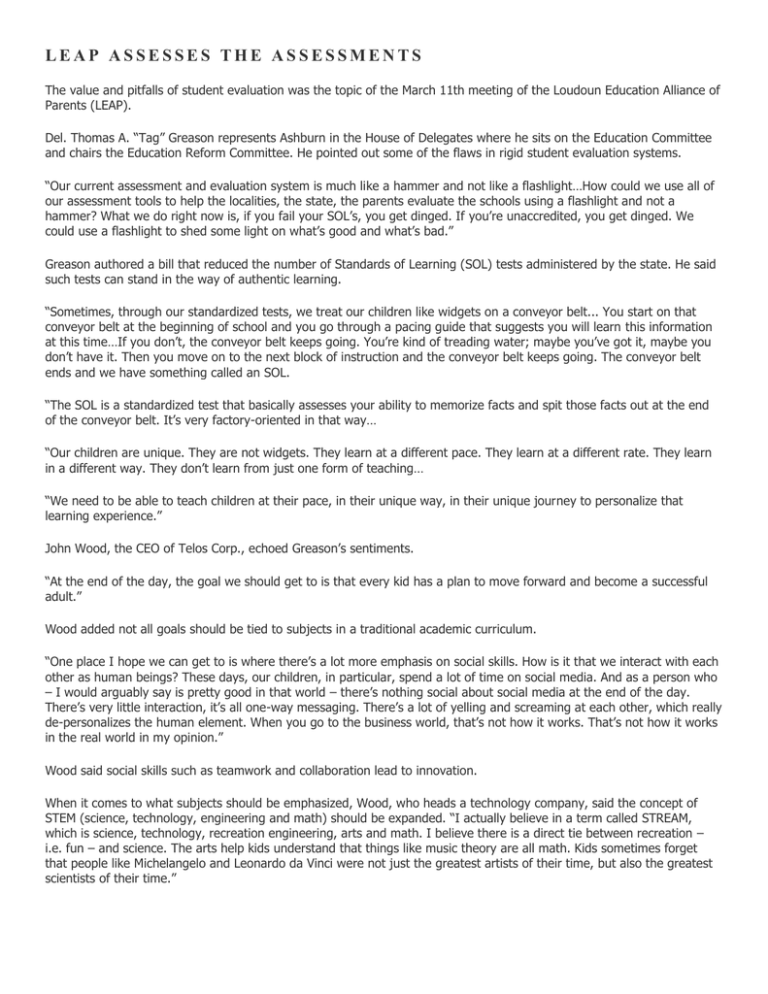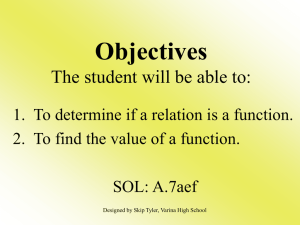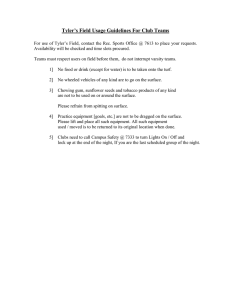L E A P A S S E...
advertisement

LEAP ASSESSES THE ASSESSMENTS The value and pitfalls of student evaluation was the topic of the March 11th meeting of the Loudoun Education Alliance of Parents (LEAP). Del. Thomas A. “Tag” Greason represents Ashburn in the House of Delegates where he sits on the Education Committee and chairs the Education Reform Committee. He pointed out some of the flaws in rigid student evaluation systems. “Our current assessment and evaluation system is much like a hammer and not like a flashlight…How could we use all of our assessment tools to help the localities, the state, the parents evaluate the schools using a flashlight and not a hammer? What we do right now is, if you fail your SOL’s, you get dinged. If you’re unaccredited, you get dinged. We could use a flashlight to shed some light on what’s good and what’s bad.” Greason authored a bill that reduced the number of Standards of Learning (SOL) tests administered by the state. He said such tests can stand in the way of authentic learning. “Sometimes, through our standardized tests, we treat our children like widgets on a conveyor belt... You start on that conveyor belt at the beginning of school and you go through a pacing guide that suggests you will learn this information at this time…If you don’t, the conveyor belt keeps going. You’re kind of treading water; maybe you’ve got it, maybe you don’t have it. Then you move on to the next block of instruction and the conveyor belt keeps going. The conveyor belt ends and we have something called an SOL. “The SOL is a standardized test that basically assesses your ability to memorize facts and spit those facts out at the end of the conveyor belt. It’s very factory-oriented in that way… “Our children are unique. They are not widgets. They learn at a different pace. They learn at a different rate. They learn in a different way. They don’t learn from just one form of teaching… “We need to be able to teach children at their pace, in their unique way, in their unique journey to personalize that learning experience.” John Wood, the CEO of Telos Corp., echoed Greason’s sentiments. “At the end of the day, the goal we should get to is that every kid has a plan to move forward and become a successful adult.” Wood added not all goals should be tied to subjects in a traditional academic curriculum. “One place I hope we can get to is where there’s a lot more emphasis on social skills. How is it that we interact with each other as human beings? These days, our children, in particular, spend a lot of time on social media. And as a person who – I would arguably say is pretty good in that world – there’s nothing social about social media at the end of the day. There’s very little interaction, it’s all one-way messaging. There’s a lot of yelling and screaming at each other, which really de-personalizes the human element. When you go to the business world, that’s not how it works. That’s not how it works in the real world in my opinion.” Wood said social skills such as teamwork and collaboration lead to innovation. When it comes to what subjects should be emphasized, Wood, who heads a technology company, said the concept of STEM (science, technology, engineering and math) should be expanded. “I actually believe in a term called STREAM, which is science, technology, recreation engineering, arts and math. I believe there is a direct tie between recreation – i.e. fun – and science. The arts help kids understand that things like music theory are all math. Kids sometimes forget that people like Michelangelo and Leonardo da Vinci were not just the greatest artists of their time, but also the greatest scientists of their time.” Loudoun County Public Schools (LCPS) Director of Instructional Services Tim Flynn said care needs to be given when analyzing data so that incorrect conclusions are avoided. “All data is good, all data is irrelevant; it depends on how you use it and what is its purpose.” Flynn and LCPS Director of Research Dr. Ryan Tyler detailed how the school division tracks student performance. In response to questions from LEAP, Tyler discussed the ways in which LCPS measures achievement. These methods include: Overall student performance on the SOL’s, including pass rates for English, math, science and social studies over multiple years. SOL performance by student group as defined by race/ethnicity, English language learners, students with disabilities and economically disadvantaged students over multiple years. Graduation rates over multiple years. Scores on college preparation tests such as the SAT and ACT. College attendance. Student performance on international assessments such as PISA and OECD. While LCPS has high achievement overall, Tyler said that there are some signs the school division needs to improve in some subject areas and that Superintendent Dr. Eric Williams has embraced a culture in which these areas will be addressed. Tyler also noted that the four LCPS focus schools once cited for academic deficiencies have closed their achievement gaps and no longer have this designation. “There are a lot of positives as far as overall achievement,” Tyler said. “But, as our superintendent says, there are some achievement gaps. It’s important for us to be held accountable for the achievement of our kids.” Tyler and Flynn said LCPS is working with active assessments that monitor students’day-to-day progress in the classroom. This allows teachers to know if a student is comprehending the material being presented. If not, the teacher can adjust their instruction to make sure the student understands what’s being taught. “I need to find a different tact to help that child learn,” said Flynn, noting that while standardized test scores are a useful measurement tool, they’re essentially “dead data.” “When teachers create assessments that they feel are rigorous,” added Tyler, “they will create assessments that are as rigorous or more rigorous that the SOL’s.” Tyler warned that using district- or school-wide data to find a school that meets your child’s needs is not the best method. He said, when moving to an area, parents should talk with the principal and educational professionals associated with a school to see what their long-range vision for their students is and what special programs they offer. “What is the long-term vision? It’s not going to come from assessment data that you pull from a report. “Which activity is going to meet the needs of your child? You know your child better than anyone.” The next LEAP meeting will be April 8th. The subject will be “Advocating for Your Child.” 03/18/15/wbb



